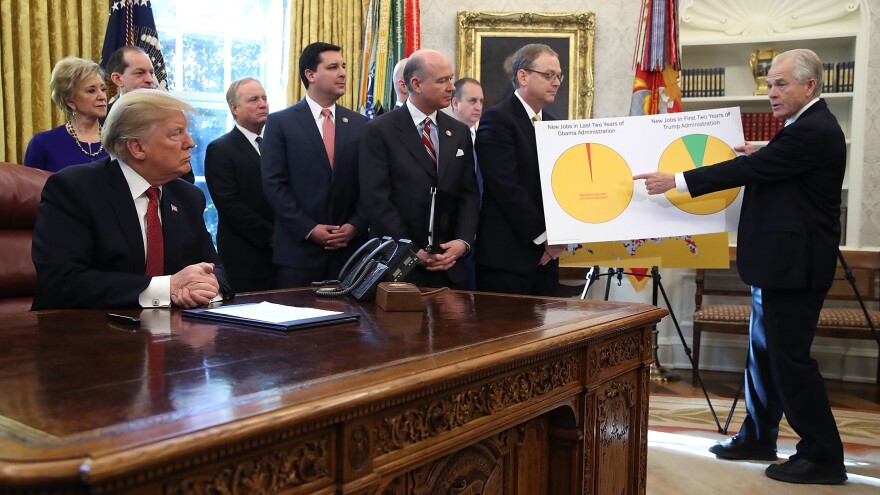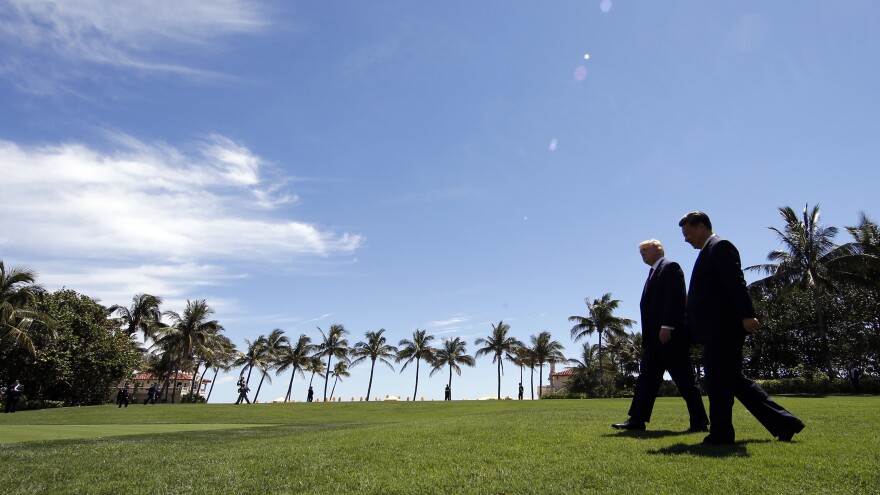President Trump escalated the trade fight with China this week, saying he will steeply increase tariffs on Chinese products this Friday.
But while the White House projects a unified front in favor of wielding tariffs as a weapon against China, it wasn't always this way.
Early in Trump's presidency, close advisers fought bitterly over whether tariffs would help — or devastate — the U.S. economy, those advisers told NPR and the PBS show Frontline.
"If you take all the other nastiness on the things like the Paris accord and the [Trans-Pacific Partnership agreement] ... roll it up and put it to the factor of 10, they don't compare to these weekly nasty trade meetings," said Steve Bannon, Trump's former chief strategist.
"These arguments would get quite personal," Bannon added.
And the disagreements weren't just behind closed doors.
"They were having fights in front of the Chinese delegation, which is like a cardinal sin of negotiating," says Susan Thornton, former acting assistant secretary of state for East Asian and Pacific affairs.
As for the president, he has long railed against China and its trade relationship with the United States, calling the U.S.-China trade deficit "the greatest theft in the history of the world." On the campaign trail, he frequently offered tariffs as a way to rebalance trade with China and revive American manufacturing jobs.
"We can't continue to allow China to rape our country, and that's what they're doing," Trump said in one typical speech before an energized crowd at a 2016 campaign rally in Indiana.
Bannon says the message connected viscerally with Trump's core supporters.

"You could tell in sitting in the audience when he started talking about trade, when he started talking about China, these working-class people would lean forward," Bannon says. "No other Republican talked like this."
Still, when Trump was elected, he assembled a team of advisers who were not always in agreement about how to confront China. And the group quickly splintered, deadlocked over whether tariffs would bring China to heel — or send the world's two largest economies into turmoil.
In one camp, which came to be called the nationalists, were pro-tariff advisers like Bannon and Peter Navarro, a hawkish economist. Opposing them were the globalists, including economic adviser Gary Cohn and Army Lt. Gen. H.R. McMaster, then Trump's national security adviser.
"We agreed on what the fundamental issue was," says Cohn, former president and chief operating officer of Goldman Sachs. "We agreed that the forced technology transfer, the lack of market access, the copyright infringements was all a huge problem. What I think we had different methodologies on is how we were going to solve that problem."

Cohn believed that heavy tariffs would hurt the U.S. — that they would make the Chinese products that Americans buy more expensive and that business growth would slow as a result. He and other globalists wanted to partner with other countries to confront China with powerful alliances.
Bannon and Navarro wanted to use tariffs to force China to the table and end long-standing issues of intellectual property theft and unfair practices. They believed higher prices on Chinese goods would protect U.S. jobs and bring back manufacturing.
Bannon says there was no room for compromise.
"A couple of times we had blowups. I mean, there was a blowup in the Oval Office," he says. "[Navarro] pulls out one of his charts, which the president loves. The next thing you know, we had this big blowup. We had to exit and go back into the Roosevelt Room."
Cohn accused the nationalists of using glossy charts and pictures to make their case with the president, instead of using actual data.

"From time to time, there were people that tried to use unfootnoted, undocumented facts," Cohn says. "It's my job to get rid of the undocumented, unfootnoted facts and make sure that those don't enter the Oval Office."
Navarro declined NPR and Frontline's request for an interview.
McMaster says everyone in the room was concerned from the beginning about the economic threat China posed.
"The president's eyes were wide open and so were all the members of his cabinet," McMaster says.
But some of the disagreements are still raw. When told what McMaster said about Trump's advisers being clear minded on China, Bannon responded, "That is a total and complete lie."
"I fought that guy every day," Bannon says of McMaster. "I don't want to hear his nonsense now that he realizes he was on the wrong side of history."

By the end of 2017, when Trump and his team had begun trade negotiations with their Chinese counterparts, the discord was seeping well outside the White House.
Thornton, who has served under 10 secretaries of state, says trying to present a strong, unified front to the Chinese when White House advisers were fighting internally — and externally — was one of the hardest assignments of her career.
"It makes it look like your delegation doesn't know what it's doing and that the leader doesn't have sufficient authority to negotiate. But that was happening," Thornton says. "You can't have this team that's fighting with itself. That's a big disadvantage."
Bannon says it doesn't matter if the Chinese knew top officials weren't on the same page. He intended to win.
"We came loaded," he says. "The most intense fights and debates in the White House, OK, were about this issue of tariffs, but tariffs as a proxy to the great economic war with China that we were engaged in."

For Bannon and the other nationalists, the effort paid off. In March 2018, Trump announced tariffs on steel and aluminum, and six months later he imposed additional tariffs on $200 billion in Chinese goods.
Cohn accepted defeat.
"Did I feel like I had represented the nontariff side of the equation for many people in the White House that didn't want tariffs?" he asked. "I did. I felt like I had done everything I can. It's no different than if you play a sport and you lose a game. If you left it all out on the field, you feel OK. I felt like I had given it my best effort."
But he says the White House globalists aren't the only ones who lost.
"Who I think lost was the United States consumer," he says. "Someone's paying the tariff. Whoever's paying the tariff is the loser. For every dollar of tariff that's collected, it's coming out of disposable income of the United States consumer today."

Cohn left the White House less than a week after the steel tariffs were announced. In the weeks and months that followed, McMaster left his job, and Thornton left her post at the State Department. Bannon had already resigned in 2017, after clashing with other members of Trump's team.
Economists say it's too soon to know the tariffs' impact. So far, the trade deficit with China has only grown. But Bannon says he and other like-minded nationalists were always thinking beyond mere economic indicators.
"I think ultimate success is regime change [in China], and I realize in that regard I'm considered a radical," Bannon says. "I think the goal into China is quite simply ... to break the back of this totalitarian mercantilist economic society."
Copyright 2021 NPR. To see more, visit https://www.npr.org.



